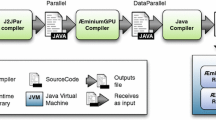Abstract
Parallelizing compilers have made great progress in recent years. However, there still remains a gap between the current ability of parallelizing compilers and their final goals. In order to achieve the maximum parallelism, run-time techniques were used in parallelizing compilers during last few years. First, this paper presents a basic run-time privatization method. The definition of run-time dead code is given and its side effect is discussed. To eliminate the imprecision caused by the run-time dead code, backward data-flow information, must be used. Proteus Test which can use backward information in run-time, is then presented to exploit more dynamic parallelism. Also, a variation of Proteus Test, the Advanced Proteus Test, is offered to achieve partial parallelism. Proteus Test was implemented on the parallelizing compiler AFT. In the end of this paper the program fpppp.f of Spec95fp Benchmark is taken as an example, to show the effectiveness of Proteus Test.
Similar content being viewed by others
References
Zhu C, Zang B, Chen T. The design considerations and test results of AFT — A new generation parallelizing compiler. InProceedings of the 1997 Conference on Advances in Parallel and Distributed Computing, IEEE, Shanghai, Mar. 1997, pp.416–423.
Zhu C, Zang B, Chen T. An automatic parallelizer.Journal of Software, 1996, 7(3): 180–186. (in Chinese)
Wilson R, French R, Wilson Cet al. SUIF: An infrastructure for research on parallelizing and optimizing compilers.ACM SIGPLAN Notices, December, 1994, 29(12): 31–37.
Blume W, Eigenmann R, Faigin Ket al. Restructuring programs for high-speed computers with polaris. InProceedings of the 1996 ICPP Workshop on Challenges for Parallel Processing, August 12, 1996, pp.149–161.
Zhu C, Yew P C. A scheme to enforce data dependence on large multiprocessor systems.IEEE Trans. Sofw. Eng., June, 1987, 13(6): 726–739.
Rauchwerger L, Padua D. The PRIVATIZING DOALL test: A run-time technique for DOALL loop identification and array privatization. InProc. the 1994 Int. Conf. on Supercomputing, July, 1994, pp.33–43.
Rauchwerger L, Amato N, Padua D. Run-time methods for parallelizing partially parallel loops. InProc. the International Conference on Computing, Barcelona, July, 1995, pp.137–146.
Li Z. Array privatization for parallel execution of loops. InProc. ICS’92, Washington D.C., USA, July, 1992, pp.313–322.
Tu P. Automatic array privatization and demand driven symbolic analysis [Dissertation]. Department of Computer Science, University of Illinois at Urbana-Champaign, 1995.
Author information
Authors and Affiliations
Additional information
This project is supported by the National Natural Science Foundation of China under grant No.69903003, Defense Science and Technology Key Lab Foundation of China under grant No.JS 94.6.1 JW0703 and Doctoral Programme Foundation.
Li Jianhui received the B.S. degree in electrical engineering from Southwest Jiao Tong University in 1994 and the M.S. degree in computer science from Fudan University in 1997. He is now a lecture, in the Parallel Processing Institute of Fudan University. His current research interests include parallel compilers and parallel processing.
ZANG Binyu received his B.S. degree and M.S. degree both in computer science from Fudan University in 1987 and 1990 respectively. He is now an associate professor in the Parallel Processing Institute of Fudan University. His current research interests include parallel compiler and parallel processing.
WU Rong received the B.S. degree in computer science from Fudan University in 1998. She is now an M.S. candidate in the Parallel Processing Institute of Fudan University. Her current research interests include parallel compiler and parallel processing.
ZHU Chuanqi received the B.S. degree in mathematics from Fudan University in 1965. He is currently a professor, Ph.D. supervisor and director of the parallel Processing Institute of Fudan University. His research interests include parallel processing and parallel compilers.
Rights and permissions
About this article
Cite this article
Li, J., Zang, B., Wu, R. et al. Run-time data-flow analysis. J. Comput. Sci. & Technol. 17, 442–449 (2002). https://doi.org/10.1007/BF02943284
Received:
Revised:
Issue Date:
DOI: https://doi.org/10.1007/BF02943284




